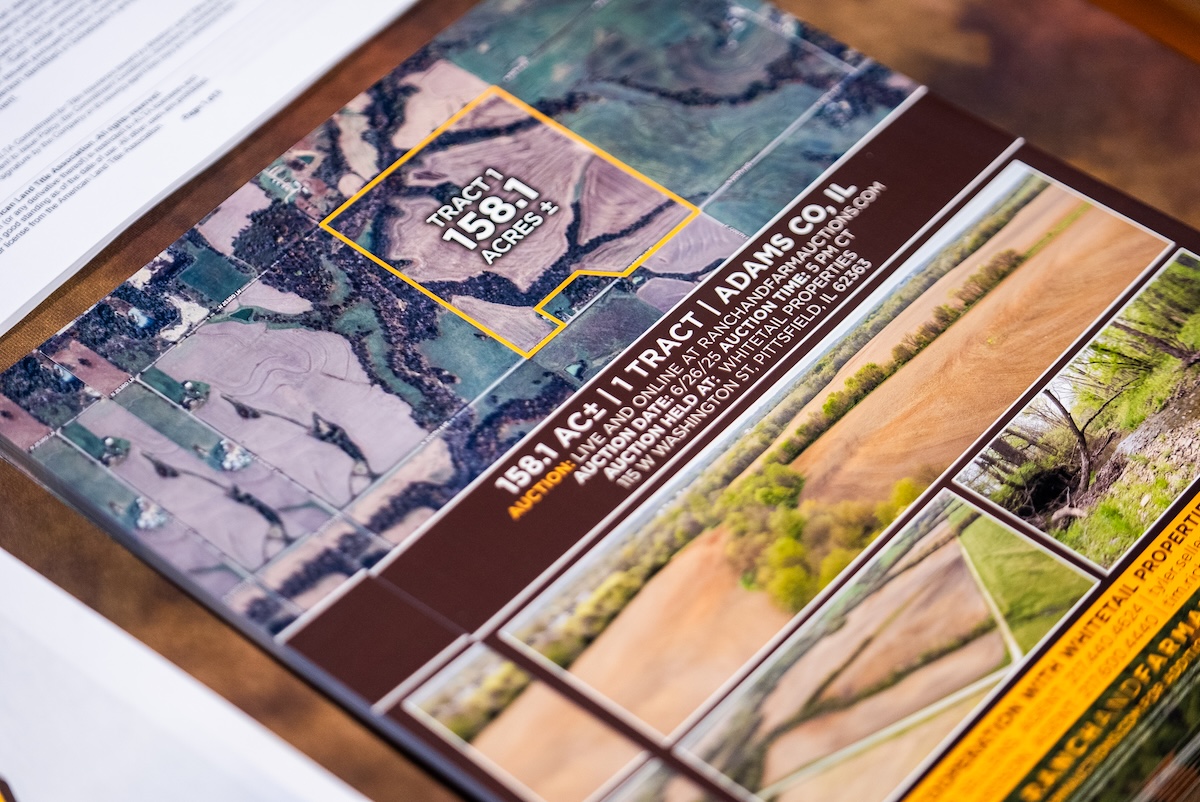
Why a No-Reserve Auction Might Be Your Best Bet
Many real estate auctions have a reserve that must be met. Others are absolute auctions, though, designating an auction without reserve. This land auction strategy offers clear advantages for buyers and sellers alike, some of which are shared interests by all parties involved. Here’s why a no-reserve auction might be your best bet for auction success.
Editor’s Note: This is not financial, investment, legal, or real estate advice. Consult with a financial planner, investment specialist, real estate lawyer, and real estate professional before buying or selling land at auction. Contact Ranch & Farm Auctions for a consultation regarding your potential auction.

Reserve vs. No-Reserve Auction
Some landowners and potential buyers alike might wonder, what is a no-reserve auction?
“A no-reserve auction means that, when you conduct the auction, the final and best bidder is 100% going to be the new owner of that property or land that you're selling,” Lowderman said.
In contrast, some auctions have a reserve, though. This is the antithesis of the no-reserve auction option.
“At the end of the day, or when the auction is over, the seller or the party that you're working for, has the right and privilege to look over everything,” Lowderman said. “They can decide if they want to accept the high bid. Or obviously they can reject it.”
Oftentimes, the main reserve is the lowest total the property must sell for in order for the landowner to let it go. Think of it as the price floor, but it can certainly surpass that if the bidding demands it.
With reserve auctions, a seller determines what they need or want to get out of the property before letting it go. The reserve amount isn’t disclosed to the bidding public. However, most sellers have a number in mind before the auction begins. Other times, it’s more fluid, and they accept what the market determines the property is worth.
“For some people, it's more fluid,” Lowderman said. “For others, it would be a number that’s set in stone, so to speak.”
Properties with multiple tracts doesn’t really change this mindset, either. The same overall concept applies.
“When you're working or dealing with multiple properties or multiple tracks, a lot of people just want to look at the bottom line of the total dollars,” Lowderman said. “So, to label or put a specific official number on each tract is not necessary.”
According to Lowderman, with reserve auctions, if the landowner chooses not to let the property go, it typically reverts back to a traditional listing. Then, fees or commissions would be collected if it sells via that manner. Of course, the contract will have a clause that outlines all policies and procedures for both reserve and no-reserve auction expectations and operations.
For buyers, before each auction, it’s usually announced if it will be a reserve or no-reserve auction. Otherwise, you can generally assume it will be a reserve auction. Of course, either way, this will be covered on auction day during the terms and conditions announcements before the start of bidding.
Benefits of No-Reserve Auctions for Buyers
Potential buyers might be interested in the benefits of a no-reserve auction. Without question, there are definitive advantages to this auction type. Oftentimes, publicizing a no-reserve auction can draw bigger crowds, because they know with certainty the property will sell.
Lowderman says, from the buyer’s stance, they tend to have this consistent viewpoint.
“They know that, when going to the auction, that property or land is absolutely going to trade hands,” Lowderman said. “Whoever wins the last bit — they are ultimately the new owner.”
Additionally, buyers often attend the auction with hopes of a chance at a bargain. This is true for multiple reasons. First, no matter what the property brings at auction, it will convey — even if the entirety of the auction does indeed produce a bargain buy.
There’s another definite advantage for those attending auctions with multiple tracts. Odds of obtaining a bargain on a single tract are even better than one on the entire property. Some bidders might focus their attention on more attractive parcels, leaving fewer bidders to run up the price on lesser tracts.
Overall, this auction method completely removes any anxiety buyers might have with reserve auctions. There’s zero chance of bidders becoming frustrated by a reserve not being met. Oftentimes, this results in highly engaged crowds.

Benefits of No-Reserve Auctions for Sellers
The greatest advantage of a no-reserve auction for sellers is increased interest among potential bidders. This can draw larger crowds. More times than not, this results in a competitive bidding atmosphere. Bidders remain invested, and interested, in the auction proceedings.
Despite the lack of a reserve, the idea that buyers might obtain a bargain can be the very thing that leads sellers to enjoy higher sale prices. Generally, larger crowds increase the competition. Then, once the bidding takes off, the fast-paced action can lead to a frenzy of bidding. The auction process can trigger bidders to run up the price in hopes of delivering the winning bid.
Furthermore, with the no-reserve designation, it signals to buyers that the seller is completely committed to selling. It might make the difference in a bidder attending your auction over another one occurring at the same or similar timeframe.
When this happens, it can drive up prices significantly. There is potential for the final sale price to greatly exceed general hopes or expectations. Obviously, there’s no guarantee of this. But no-reserve auctions do have a reputation for producing such outcomes.
Another important positive is a definitive timeline. The seller knows with complete certainty that the property will sell. Once the auction is complete, that’s it. The property will be sold.
“From the seller's standpoint, you have a definite sale, so to speak,” Lowderman said. “You know the sale date — obviously, you know when that's going to happen. Then, most generally, the closing date is 30 days from that.”
This is an important distinction, because oftentimes, sellers have no option but to let the property sell. Reasons vary for each instance. However, commonly cited reasons include the need to liquidate personal assets, liquidating and distributing estates, liquidating property to buy other real estate, and more. There’s a certainty of a fast property transfer and offloading of assets. Enjoy the guaranteed and reliable success of a completed and timely auction.

Other Considerations of No-Reserve Auctions for Buyers and Sellers
Buyers and sellers alike should both know that their respective advantages of no-reserve auctions aren’t guarantees. The seller might see increased bidding, but it’s not a surety. Likewise, the buyer could have an opportunity at a bargain, but that isn’t a certainty, either. Fortunately, sellers and buyers alike can rest assured there will be a final outcome at the end of the sale. That is a guaranteed advantage that benefits all parties involved.

Selling Your Land at a No-Reserve Auction
The best advantage of a no-reserve auction is transparency of true market value. There is no price floor in place. Thus, everyone accepts the final bid as the true and fair value, effectively determined by the assembly of authentic and interested bidders.
“I think, at the end of the day, putting both sides together incorporates more interest,” Lowderman said. “Obviously, from a buyer’s perspective, you know it's going to sell. And from the seller’s perspective, you do as well. But you're on a timeframe and know — as far as the acceptance of the high bid and the closing date — funds will be collected.”
For landowners looking to sell at auction, contact Ranch & Farm Auctions. We can answer questions and help with your auctioneering needs. For buyers hoping to purchase land, check out some of the upcoming Ranch & Farm Auction events near you.
Published on 2025-10-24